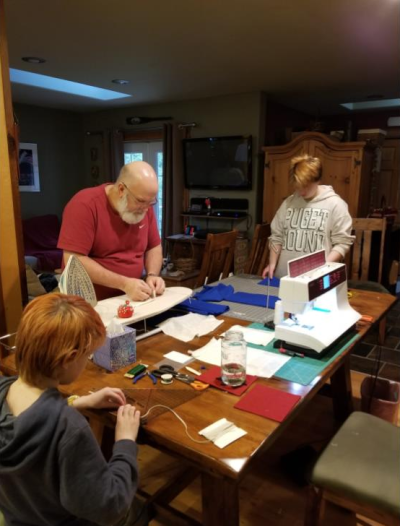Essential personnel across Whatcom County need masks; can you help?
Staying at home may not feel like a heroic act but is saving lives. Our essential workers at Western and beyond are on the front lines of maintaining our community’s wellbeing, and many other people are at a higher risk for serious and life-threatening illness due to Covid-19. They are counting on the rest of us to Stay Home, Stay Healthy.
Western’s Center for Community Learning, under Incident Command System’s guidance, is encouraging students, staff and faculty to engage in community efforts safely and responsibly. This week we are highlighting the opportunity to make much-needed surgical masks at home. Permanent Classified and Professional staff employees have the option to use community service hours to volunteer with this effort. The Community Service Day is available until June 30 and cannot be carried forward to the new fiscal year. Be sure to check your leave balances on Web4U and get approval from your supervisor before using community service day hours. Faculty volunteer guidelines can be found here.
There are many mask-makers in our area from those supporting Frontline Masks’ efforts to Whatcom County Community Face Mask Team on Facebook and everything in between. We talked with Kelly Krieger of Riveters Collective for tips on making surgical masks for our local providers.
Q: What supplies do volunteers need in order to get started with making surgical masks for our local frontline workers?
A: For making masks with our Riveters Mask Makers group, fabric, tie material, and sewing skills are required. However, we do manage to share materials amongst ourselves. We are using quilting type cottons, and there are You Tube videos available on the Facebook page at https://www.facebook.com/groups/209975086897715/. (Special Note: PeaceHealth created detailed instructions for making community face masks which can be found at this link.)
If working with the Frontline Project, workers just need to have basic cutting OR sewing skills. They also need workers to wash the fabric prior to cutting. More information about making Frontline Masks or requesting kits can be found here: http://frontlinemasks.com/.
Q: It sounds like there is an elastic shortage right now. Do you have suggestions for elastic alternatives?
A: Elastic is hard to come by, but our group is getting 500 yards. Many of us are using ties, which are a great alternative. The elastic we are receiving contains latex, so is not accepted by PeaceHealth, but there are PLENTY of organizations locally who need and want masks. We are donating masks daily to nurses, Planned Parenthood, Sean Humphrey House, and the Lummi Nation. Even your bus drivers and grocery checkers need these masks! Special Note: Bellingham Makerspace is working closely with Whatcom Unified Command and may also have elastic available for those making masks. Inquire with Makerspace: https://bellinghammakerspace.org/contact/.
Q: What other tips should sewers new to this effort keep in mind?
A: If you plan to make masks using your own materials, please remember to prewash your fabric and dry it in a hot dryer for shrinkage.
Q: What should people do with completed masks?
A: I am doing pick up runs to people’s homes every few days. People are also welcome to drop masks off at my house. I can be reached at kjkrieger27@gmail.com.
Homemade masks can also be dropped off at Bellingham Makerspace:
Makerspace
1 Bellis Fair Parkway #618
Bellingham, WA 98225
1Noon -to 5 p.m., Monday through Friday
Directions: Makerspace can be found in the loading cul de sac to the right of Dick’s Sporting Goods at Bellis Fair Mall. Someone will be manning the door during the hours listed above. DO NOT come into the facility. If no one is at the door, ring the bell and someone will come to assist you.
Q: What safeguards or precautions need to be kept while people are sewing and handling the masks?
A: Anyone who is experiencing any symptoms of illness, including fever, cough, or any cold like symptoms should not be working on these masks. If you would like my assistance with pick-up/delivery I do ask that masks are laundered and dried in a hot dryer before handing them off to me. PeaceHealth provides additional safety instructions in their Community Face Mask Instructions.
If you’d like to get involved please reach out to a local mask-making group that works for you and remember to keep practicing responsible social distancing as you engage with these community efforts! Western in also in need of masks and encourages people to support the efforts to protect our essential workers on campus. Members of the Western community who wish to volunteer or otherwise contribute to the community during this this crisis should contact April.McMurry@wwu.edu of the Center for Community Learning. April will be serving as Western’s community liaison for this purpose.
